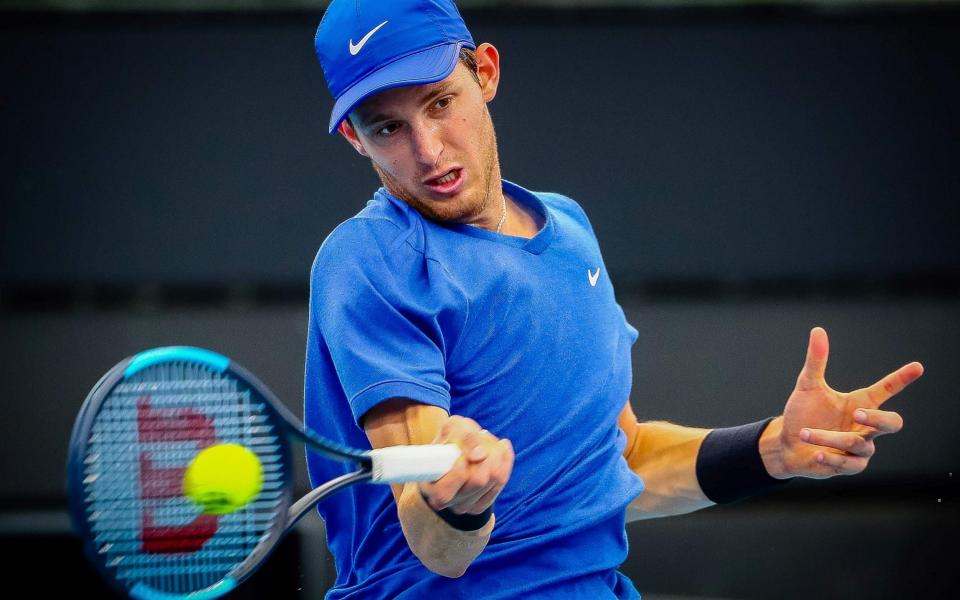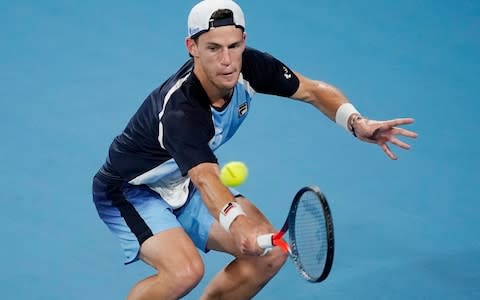Revealed: The leading coaches with doping pasts

As tennis recovers from players' doping drug tests, Edmund Wilson, Jannik Schneider and Simon Briggs report on mentors with tainted backgrounds
After the recent news that two high-profile players will miss today’s Australian Open after testing positive for banned steroids, an urgent question hangs over this showpiece event. Does tennis have a doping problem?
This week in Melbourne, The Daily Telegraph spoke to leading players about the positive tests of world No 78 Nicolas Jarry and reigning Wimbledon doubles champion Robert Farah. We encountered a widespread belief that both men would be exonerated, having suffered from cross-contamination.
“I can’t imagine these guys are dopers,” said world No 5 Dominic Thiem. “It is ridiculous and is completely made up, for us. It’s a mistake in the system.”
Yet there is proof that doping exists in the sport. Players test positive and former players who served doping bans still work in the game.
The Telegraph can reveal that Martin Rodriguez – who is Nicolas Jarry’s uncle-in-law, and was also his coach until October last year – committed an anti-doping rule violation during his own career. At the turn of the century, he was part of a group of players who left Argentinian tennis fighting for credibility.

There followed a scandal that for the first time hinted at what might lie beneath the surface. Between 2001 and 2006, a time when drug-testing was woefully inadequate, six Argentine players became embroiled in doping cases.
Among others, Guillermo Canas (who in 2007 famously beat Roger Federer in successive tournaments) tested positive for a masking agent, while Guillermo Coria (who reached the 2004 French Open final) tested positive for nandrolone. Meanwhile Juan Ignacio Chela tested positive for synthetic testosterone. Rodriguez, Jarry’s former coach, had taken excessive levels of caffeine.
The players all claimed inadvertent use, which was accepted by the tribunals, resulting in lesser punishments. But Dick Pound, who was the World Anti-Doping Agency president at the time, had strong words for Mariano Puerta in particular. Puerta had tested positive for the second time in his career when he played Rafael Nadal in the 2005 French Open final.
“Somebody who has tested positive twice in less than two years is someone who clearly doesn’t think the rules apply to them,” Pound said.
The country’s players blamed the Argentinian federation for the spate of positives, which they attributed to problems such as contaminated substances and simply being uninformed. They had already been calling on their federation to follow in the footsteps of Spain and France and provide more support to the country’s players, even before the doping infractions occurred.
Coria, whose defence of contaminated supplements was accepted by the relevant authorities, eventually defected to the Spanish system. He hired Dr Angel Ruiz-Cotorro, who has been Nadal’s doctor since he was 14. Coria said: “He [Ruiz-Cotorro] attends to all Spanish tennis players and nothing ever happened to them. He is very professional and tidy.”
In 2018, the Argentinian tennis federation came to an agreement with the state-of-the-art Rafael Nadal academy that allows Argentine players to base themselves there while on tour in Europe.
After their playing careers ended, several of the players who had tested positive stayed in tennis. Canas and Coria served as Argentina’s Davis Cup captains in 2018, while Rodriguez became Jarry’s coach. The most successful of them all after a playing career, Chela, has coached Diego Schwartzman to his current position of Argentinian No 1 and world No 14, as well as two of his three ATP tour titles.
In Melbourne this week, The Telegraph asked Schwartzman if he had sought assurances from Chela concerning his positive test for testosterone. Schwartzman replied: “We discussed it. My coach did a mistake. It was a contamination in the vitamins.”

Chela, in fact, did not take contaminated vitamins. He claimed he was given testosterone, in pill form, by a doctor, which he thought was vitamins and amino acids. The ATP accepted that he had inadvertently ingested the testosterone. He was banned for three months.
As for the two cases that emerged last week – and would surely have received more attention but for the air-quality crisis enveloping the Australian Open – the world’s top-ranked doubles player, Farah, broke the news on Tuesday that he had tested positive for the steroid boldenone in October last year. Farah has withdrawn from competition in Melbourne.
His regular partner and Colombian compatriot, Juan Sebastian Cabal, entered the men’s doubles with Spain’s Jaume Munar instead. Cabal’s mixed doubles partner, Abigail Spears, with whom he won the 2017 Australian Open, tested positive for testosterone just seven weeks before Farah.
Farah described the news of his positive test as “the saddest moment of my life”, and claimed the adverse test could be due to eating contaminated meat. “This substance is frequently found in Colombian meat and can affect the results of tests to athletes,” wrote Farah, who had tested positive out-of-competition in October. “I am sure that this condition in what generated the result of the test in question.”
On the day of Farah’s announcement, the International Tennis Federation (ITF) provisionally suspended Chilean Jarry, who was ranked as high as No 38 last year at a time when he beat Germany’s Alexander Zverev.
Jarry provided a urine sample that showed the presence of stanozolol, the steroid used by disgraced Canadian sprinter Ben Johnson during the 1988 Olympics, and ligandrol, which has similar properties to steroids, during last season’s Davis Cup final in Madrid.
Jarry blamed multivitamins he claimed to have taken in Brazil on the advice of a doctor who had “guaranteed” that they were free from banned substances. He wrote: “I have never deliberately or intentionally taken any banned substance in my career as a tennis player and, in fact, I am completely opposed to doping.”
Speaking to The Telegraph this week, Schwartzman said: “There are a lot of talks in the dressing room. It is a very difficult situation for the South American players Jarry and Farah. I really don’t know what happened.”
Up-and-coming player Casper Ruud, from Norway, told The Telegraph: “It is not easy to comment on the Jarry case because you don’t know too much about it yet. But of course, everyone in the locker room is talking.”
When asked about the potency of the substances found in Jarry and Farah’s doping tests, Ruud said: “It is not necessarily that steroids make you a better tennis player. That does not help your forehand. In general, we are all against doping.”
Similar views have often been expressed by senior players such as Novak Djokovic, who said in 2016: “As long as there is no proof that somebody is doping, the sport is clean.”
Late last year, Thiem said he would vouch for the players he knows being clean and that doping would not help them play better. On Saturday, The Telegraph asked Thiem if his view had changed. “Nothing changed,” he said. “My quotes stand. I think about this exactly the same way, 100 per cent.”
Thiem then explained what he had heard about Jarry’s case. His coach Nicolas Massu, also Chilean, is Jarry’s Davis Cup captain.
“He [Jarry] was tested negative in Paris Bercy,” Thiem said. “Then his mother brought him multivitamin tablets to the Davis Cup finals in Madrid. He took them there. Then he was tested positive. For me the whole story, that he was tested positive, is ridiculous.
“First of all, he lost 12 or 13 matches in a row. Then he is not that type of player, where doping would help him.
“In general it is a complete farce how much we are restricted about things. If we forgot our electrolyte drinks at home, we cannot buy anything – not even in a supplement store in the US – without being worried that something is contaminated.”

